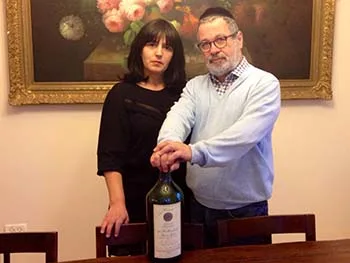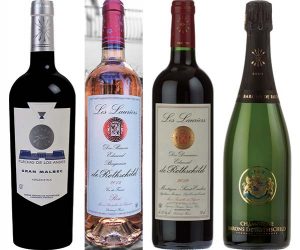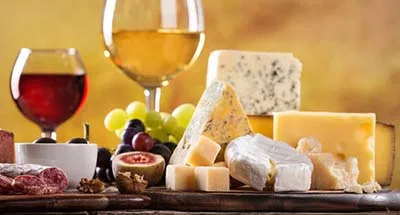
Month: June 2016

TURNING POINT

One of the seminal events that marked the development of the kosher wine industry took place exactly thirty years ago. This was the production of the first Rothschild kosher Bordeaux wine. Until then most kosher wine in France was simple, inexpensive and more prized for its hechsher than its quality.
At this time a young Jewish guy called Pierre Miodownik, of Polish parents, was becoming frustrated at the lack of quality of the wine he drank and dreamed of producing quality kosher wine. He knew it was possible if he had the right opportunity. He lived in the Languedoc. It was scarcely a center of the Jewish community, nor was it then known as a place for quality wine.
Miodownik had slipped into wine because it was all around him. Languedoc was even then one of the largest producing wine regions. As a religious Jew, he became involved in making kosher cuvées to supply demand, but with no pretention to quality. He knew the wines were not great, and sought a way of doing better. This quiet, slightly diffident, unassuming Frenchman then got the opportunity of his life. He was put in contact with Baron Edmond de Rothschild himself.
Baron Edmond de Rothschild was the grandson of the Baron Edmond de Rothschild we revere so much in Israel. The grandfather founded Carmel Winery, built the two largest wineries in Israel at Rishon Le Zion and Zichron Ya’acov and planted vineyards all over Israel. In doing so he founded the modern Israeli wine industry.
His son James donated Rishon Le Zion and Zichron Ya’acov Cellars to Carmel Winery in 1957, thus ending the family involvement with Israeli wine, and founded the Yad Hanadiv Foundation.
However the family’s immense support of Israel continued. The grandson with the same name also benefited Israel by founding the Caesarea Rothschild Foundation. Furthermore, Yad Hanadiv helped to build the Knesset, the new Supreme Court Buildings, the Mishkenot Sha’ananim Music Center and a current project is the National Library. The contributions are endless.
Baron Edmond the younger, was a part owner of Château Lafite Rothschild. His cousins, stemming from the English branch of the family, owned Château Mouton Rothschild. These are two of the great Bordeaux Châteaux, purchased by the family in 1868 and 1853 respectively.
When Baron Edmond decided also to enter wine, he had an opportunity to buy Chateau Margaux, another of the great French wineries, but instead decided to be a wine pioneer and to create. He went for Cru Bourgeois instead of Premier Cru Classé and purchased Château Clarke in the more unfashionable, comparatively unknown region of Listrac in the Medoc, Bordeaux. He invested a fortune in Château Clarke. The estate was modernized, the vines replanted, and the wines improved no end. He succeeded in bringing this region, and that of Moulis, to the attention of wine lovers.
When the shy Miodownik met the Baron, he was nervous, but the Baron could not have been nicer or more welcoming. He told him about his grandfather’s commitment to Israeli wine and the Rothschild’s ongoing contributions to the Jewish community. He told him he felt almost an obligation to continue the support of the Jewish community by producing kosher wine.
This was the opportunity young Pierre sought. The Baron empowered him and told him to do it, whatever it took.
So they produced a wine called Barons Edmond de Rothschild Haut Medoc from the 1986 vintage. It was not inexpensive, carried the Rothschild name and was from Bordeaux. It was watershed wine in the niche world of kosher. After this it became more fashionable for famous Châteaux in France to produce kosher wine. However though many of those who have dabbled in kosher wine do not make it every year, the Rothschild wine continues to be made, year in, year out, not missing a vintage.
Pierre Miodownik went on to become the most revered kosher winemaker in Europe, and Baron Rothschild continued to produce high quality, fine wines in the general wine world through his wine company, which was called Companie Vinicole Baron Edmond de Rothschild (CVBER).
The CVBER today owns the Bordeaux Châteaux in the up and coming regions of Listrac and Moulis. Châteaux Clarke (Listrac) and Château Malmaison (Moulis) were purchased in 1973, followed by Château Peyre-Lebade in 1979.
After Baron Edmond passed away in 1997, his son Baron Benjamin and wife Baroness Ariane continued the growth of the company with a joint venture in South Africa with Anton Rupert (Rupert & Rothschild) in 1997 and in Argentina with Laurent Dassault (Flechas de los Andes) in 1999.
They then returned to Bordeaux to purchase Château des Laurets in Puisseguin-St. Emilion. This was followed by the founding of Macan in Rioja, a joint venture with Vega Sicilia, the greatest name in Spanish wine, and Rimapere in 2012, in partnership with Craggy Range in Marlborough New Zealand.
CVBER is a well-run company with a fascinating list of wineries, each producing some very high quality, authentic regional wines, which remain true to their origins and local terroir. Despite their immense contribution to Israel and to Israeli wine, unfortunately they have not yet made the leap to having a joint venture or partnership with an Israeli winery. However they list some serious wines for serious wine people, which are well worth seeking out.
The latest initiative has been a joint venture between the three great Rothschild wine houses in production of a high quality Champagne called Champagne Barons de Rothschild. This includes a kosher cuvée.
CVBER continue to remain loyal to Baron Edmond de Rothschild’s wish to make quality kosher wine. To make a kosher wine in a non-kosher winery can be costly in terms of time and money. Quite frankly it can be a nuisance to an efficient winery. Yet to her credit, Hélène Combabessouse, the Commercial Director of CVBER, who must be frantically busy all the year round, can be found at most of the large annual kosher tastings whether in London, New York or Tel Aviv. She faithfully presents the kosher portfolio, with patience, a smile and a certain French elegance. It really does show a real commitment to the Jewish community and kosher wine, that CVBER have continued to serve this niche market for the last thirty years. 
The kosher wines produced by Compagnie Vinicole Baron Edmond de Rothschild are distributed by Royal Wine and Kedem Europe. The wines I tasted were as follows:
Champagne Barons de Rothschild NV
A kosher cuvée was made of the new champagne…..and this really is a fine result. It has some good toastiness on the nose, with a touch of brioche, a creamy acidity and a very refreshing finish. Without doubt this is one of the best kosher sparkling wines out there.
Les Lauriers Des Barons Edmond Benjamin Rothschild Rosé 2014
Made 100% from Merlot. It has an onion skin pink color, with very delicate berry aromas balanced with a sharp and refreshing acidity. An ideal aperitif.
Les Lauriers Des Domaines Edmond de Rothschild 2013
This wine is mainly Merlot balanced by Cabernet Franc and a little Cabernet Sauvignon. The wine is deep red in color, with ripe plum and black berry on the nose with soft tannins and effect of oak aging nicely integrated.
Barons Edmond Benjamin de Rothschild Haut Médoc 2013
The Rothschild Haut-Médoc is made 65% from Merlot and 35% from Cabernet Sauvignon. It is really the second wine of their three estates Clarke, Malmaison and Peyre-Lebade. Medium to full bodied with good black berry and blackcurrant notes, quite soft in the mouth with a pleasing finish.
Flechas De Los Andes Gran Malbec 2013
This is my favorite. A 100% Malbec which is full of up front fruit, with a mouth filling flavor, vanilla notes from the oak and a long satisfying finish. A great mouthful of wine.
FLASK OF WINE

There are the four products that really symbolize the culinary revolution in Israel more than any others. These are bread, wine, cheese and olive oil.
The festival of Shavuot gives us the opportunity to enjoy all four together. It is amongst other things a harvest festival celebrating the first fruits and the grain harvest. As it is a tradition to eat dairy products, what could be more appropriate to enjoy a selection of Israeli cheeses, a hunk of bread, with olive oil drizzled on it of course, washed down with some Israeli wines.
Once there was only a choice of white cheese, yellow cheese or salty cheese in Israeli supermarkets. Quality wines were few and far between. Olive oil was something one bought in a soft drink bottle in local Arab villages. Bread was called Achid, a rather basic version of black bread.
In the early 1980’s a few small dairies were founded which specialized in producing handmade goats’ cheese. Barkanit in the Jezreel Valley, Ein Kammonim in the Lower Galilee and Shay Seltser in the Jerusalem Hills were the pioneers that started the gourmet, boutique cheese revolution.
The wine revolution started with the Golan Heights Winery, also in the eighties, and the whole industry responded by moving to quality. The gourmet bread revolution started with Lechem Erez, (‘Erez Bread’) on the initiative of the famous Chef, Erez Komarovsky in the nineties. Then, Zeta from the Lower Galilee, Halutza from the Negev, both now large producers, and Eger from the Mount Carmel area, heralded a revival of quality Israeli olive oil.
Today there are no lack of specialist dairies, boutique wineries, regional olive presses and artisan bakeries that have sprung up all over Israel. The large producers and major brands have also responded, so production of cheese, wine, bread and olive oil in Israel today, is unrecognizable from even fifteen years ago.
There is a connection between these products that runs like a thread from Ancient Israel to modern times. The famous Persian poet Omar Khayyam summed it up correctly writing romantically about: “A flask of Wine, a Loaf of Bread – and Thou.” Go to Tuscany today and they will say that the holy trinity of Wine, Bread & Olive Oil is the basis of the Mediterranean diet.
However this all began in the Bible, when Wine, Bread & Olive Oil were the three mainstays of the economy. Wheat, Vines & Olive Oil were amongst the Seven Species blessed in Ancient Israel. When the spies sent by Moses returned after scouting out the Promised Land, they returned with a large bunch of grapes to illustrate that this was a land …”flowing with Milk and Honey.” This image of two men carrying a large bunch of grapes on a pole between them is preserved appropriately in the logos of both Carmel Winery and The Israel Tourist Board.
So I recommend that this Shavuot represents an opportunity to celebrate the flowering of gourmet Israel with these four most fundamental regional and historical products.
The world of cheese is probably more varied even than the world of wine. President De Gaulle said about France, “How can I manage a country with so many cheeses” It is a complicated world to learn, but there are basic guidelines for matching cheese & wines, which may be followed:
Red wines do not go with soft, fatty, creamy, salty or smelly cheeses.
Often dry white or even sweet wines will far better combinations.
Try and match the acidity of the wine and cheese.
Try & contrast the saltiness of the cheese.
To simplify the issue, most cheeses can be placed in the following categories:
Hard Cheeses
A hard cheese which is firm, and not aged too much, will go well with a medium to full bodied red wine. Cheddar and Parmesan are classic examples of fine red wine cheeses. However if the cheese is older and more pungent, the wine needs to be more mature and less tannic to avoid a clash. For this you will need older vintages.
Soft Cheeses
This is the hardest category to find a match. A creamy, fatty cheese will make most reds seem like water. The fat in the cheese will neutralize the tannin. Alternatively an oaky and tannic red wine will taste slightly metallic when these cheeses are ripe and runny. A pasteurized Brie or Camembert would best be served by a lightly oaked Chardonnay with good acidity. If you prefer a red wine, then one which is soft, full of fruit and with no astringency will be adequate.
Blue Cheese
Salt accentuates tannin so the myth that red wine goes with all cheeses is shown to be most false when a red wine is matched with a blue cheese. A sweet dessert wine or fortified wine, are far better matches. The salt and sweetness contrast to enhance both cheese and wine.
Goats Cheese
This category produces Israel’s finest cheeses. They have a strong character but can go with either white or red wines. The classic combination for a young goats’ cheese is a varietal Sauvignon Blanc. An aged goats’ cheese can be matched successfully with a mature well-structured but not tannic red.
Cooked Cheese
Cooked cheese goes better with white wine. A cheese sauce, like Mornay, will usually be matched well with an oaky Chardonnay, the weight of the sauce being matched by the intensity of oak. For a Fondue, a Sauvignon Blanc is recommended.
For a quiche, I recommend an unoaked chardonnay. A Pizza is best served with a fruity rosé.
Cheesecake
Finally with a rich New York cheesecake, there is nothing better than a fortified Muscat.
Sorry to disappoint red wine lovers, but as you can see, white wines are generally far better accompaniment to cheeses and dairy products than red wines. The reality does not chime with the popular image of blocks of cheese and carafes of red wine.
There are trends that indicate a return of interest in white wines. Certainly the quality and variety has improved no end. Many wineries are now making some really fine whites with typicity and authenticity, which was lacking not so many years ago.
Don’t forget that white wines are far more versatile to match with food than reds. They are also far more suitable for our hot climate than red wines. Who wants to sit on the balcony at home drinking a 15% alcohol, oak aged red wine on a hot summers evening, when a crisp dry white is also an option
So this Shavuot can also be a time to appreciate Israel’s quality white wines. It is a festival that does not only provide an excuse for an annual cheese and wine tasting, but it can also be a celebration of the four products which connect modern gourmet Israel with our Biblical roots. A glass of wine, a slice of cheese, a hunk of bread, a drizzle of oil….and thou.
POLITICAL WINE

Israeli wine has always had a special place in its surrounding society. It has had the same relevance and prominence from the days of Ancient Israel in Biblical times, until now in modern Israel. In ancient times wine was a major industry and vines, grapes and wine were frequently used as imagery that people could relate to. Just read the Bible.
In modern times, wine still plays a crucial role. The settling of the country, the planting of vineyards and production of wine has helped develop the country. Time and again the farming villages or settlements have set the political tone. Wine was at the forefront at every stage of Israel’s history.
The vineyards planted in the 1880’s are an example. The idea of working the land and making it your own was adopted by the Labor Zionism movement. The fact that David Ben Gurion, Israel’s first Prime Minister worked at the Rishon Le Zion Cellars and Levi Eshkol, Israel’s third Prime Minister, managed the vineyards, only underlined the importance of wine as a symbol of the new Israel. When Theodore Herzl, the founder of Zionism, visited Israel in 1898 he was taken to see the Carmel Winery as an active example of the Zionist dream come true. Carmel developed and maintained a new Israeli wine industry through all the problems of building the state.
Wine was prominent enough an issue, to attract the intervention of politicians. When Joseph Seltzer from Hungary wanted to found a winery in 1952, he did so, on the site of a disused perfume factory in Binyamina. There were disputes about the approvals given and only when David Ben Gurion, by then Prime Minister, became involved was the issue solved and Eliaz Winery, now renamed Binyamina, was formed.
Political intervention was also apparent in the development of the Golan Heights Winery. The Wine Growers Cooperative was against it and they had a person of influence in the right position to lead the opposition. Pessah Grupper was the Minister of Agriculture, as well as being a veteran member of the Wine Growers Cooperative, and later the chairman. This time the future of the new winery was preserved only due the strong intervention of Ariel Sharon, then the Minister of Trade & Industry. He managed to secure the approvals to push through the move to its permanent premises in Katzrin.
Sometimes it was wine that put a region on the map. The positive attributes of settlement pioneering, Israeli agriculture and advanced technology combined in the Golan Heights Winery. The Golan area came to be very much associated with the success of its wines. Its Yarden wines gained international acclaim. Wine became the most visual export from the Golan Heights and undoubtedly contributed to the fact that this area, new to Israel after the 1967 war, was swiftly adopted by the Israeli consensus.
The area known as the Territories, (aka the West Bank by lefties or Judea and Samaria by rightists), was more politically fraught. I prefer to call it from a wine region point of view, the Central Mountains. Companies opening businesses there received favorable rates and inducements and Barkan Winery was founded there. Eventually the issue of the Territories became an issue. Barkan moved to a new winery in Hulda, became Israel’s largest exporter and close to the largest winery in Israel.
In the last ten to 15 years, there are a number of new wineries that have opened in the Central Mountains. It is in their interest to show the Israeli settler as placid farmer types planting vineyards and growing wine. Again, wine is at the center of the political issues of the day, but they are using wine and wine tourism in exactly the same way as Carmel Winery and the Golan Heights Winery were used to settle the country and the Golan before them.
Those with an anti-Israel agenda like the BDS, and the relabeling proposals of the European countries are doomed to fail if their objectives are to cause financial damage. Most Israeli wine is sold in Israel and most of what is sold abroad is channeled to the Jewish market. The late legendary wine critic, Daniel Rogov, put it very succinctly: “There are domestic and overseas customers who simply won’t buy the wine because it comes from the occupied West Bank.” He went on: “In contrast there are many others who will look out those wines precisely because they come from there.” Sales will not be affected. Maybe the bad press will even boost sales.
The main damage is one of image yet wine remains Israel’s most presentable product which represents the land, agriculture, technology and Israel’s creative energy. However bashing of Israel through wine is certainly not new. I remember the crisis when I represented Yarden and the London store Selfridges succumbed to pro- Palestinian protesters outside the store and delisted the wine. That was over fifteen years ago. Meetings were held with the management and the wine was reinstated. The similar issues with the Sweden’s Systembolaget and more recently the German store KaDeWe, also involved the Golan Heights Winery.
Only the most fervent, anti-Israel campaigners categorize the Golan Heights as politically problematic and yet it is included in all the propaganda as being part of the Occupied Territories. When people rage about the Territories and include the Golan Heights, their whole argument is undermined. Likewise it is a massive failure of Israel diplomacy that the Golan Heights still has this mark of Cain on it.
After all, the Golan has been annexed to Israel, there are no Palestinians there and the adjoining country is Syria, which is in the process of disintegration. Who do the critics want Israel to hand the Golan back to The hypocrisy of it all! It is not even in any western country’s interest that the Golan should go back to any of the existing players, but the blanket approach continues.
Many see everything in Israel as political, but at least wine gives you a glimmer of hope to present the most acceptable face of Israel. You don’t always receive the welcome I did when presenting wine to Polish sommeliers when one asked me: “Why should we sell Israeli wine when you murder Palestinian children.” They don’t teach you to answer to that in wine school! However wine is one of Israel’s finest quality exports and arguably Israel’s finest ambassador. Reactions like that are rare, especially in Poland where I have many wine connections.
Wine has certainly made me a lot of friends. The people I have met with a glass in hand include right wing settlers from the territories, left wing pacifists from Tel Aviv, ultra orthodox Haredim, Israeli Arabs, Palestinian Christians, not to mention winemakers from Lebanon and Turkey. We have absolutely nothing in common, apart from an interest in wine. So I see wine as a bridge and unifier rather than something divisive. I wish people here would drink more wine than coffee, and then perhaps it would be a calmer place!
Most people in the wine trade believe wine should be separated from politics. You don’t need a flag to grow grapes and wine should be judged on quality. In other words it should be above the fray. The wine from a vineyard in Alsace did not change because it was from France or Germany. It was still the same terroir regardless of the country.
After 130 years of pioneering, it is still wineries and vineyards that are in the center of the Israel discourse. Only recently a prominent right wing politician described those Israelis that did not buy or write about wine from the Territories as enemies of the State and agents of Palestinian propaganda. Others see a difference between Eretz Israel and the State of Israel and refuse to touch a bottle from there. And that is a debate within Israel.
Every restaurant and individual must be allowed to make the decision to buy or not based on personal opinion, as with every consumer product. The freedom of what to buy without harassment is a basic right. Live and Let Live. It is only a drink made from grapes after all! Thankfully, there are enough quality Israeli wineries of every type, from every corner of the country, to provide a great deal of choice, whatever your political persuasion or religious affiliation. However I do not believe in boycotts on principle and believe they drastically weaken the arguments of those that propose them.
Wine continues to be an attraction for the full spectrum of political views, covering every corner of the country, whether disputed or undisputed. So it seems those that want to glorify or vilify Israel, from outside or within, will continue to do so, using wine as the medium.

